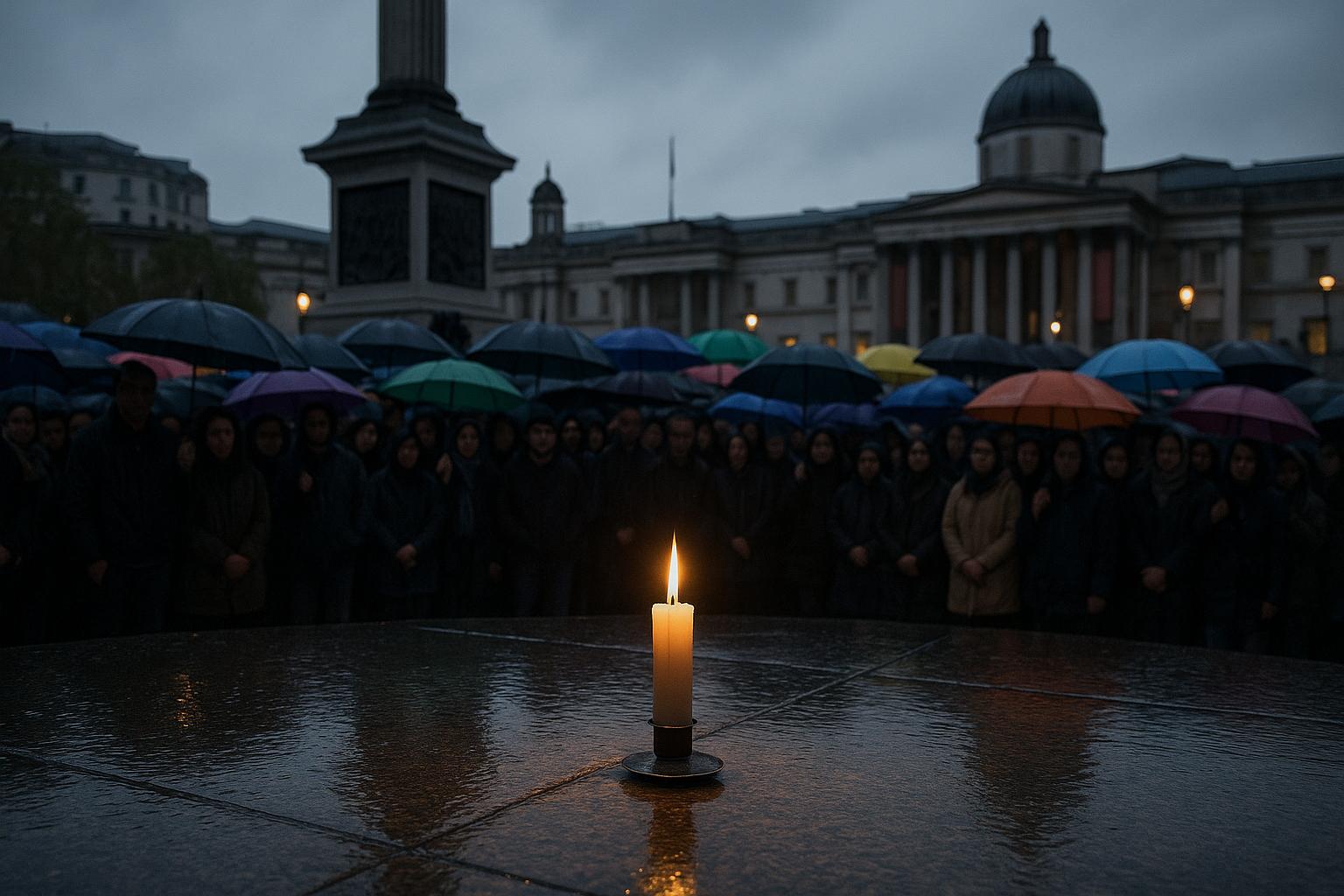Thousands gathered in central London’s Trafalgar Square on Sunday afternoon to commemorate the second anniversary of the deadly attacks that marked one of the most harrowing days for the British Jewish community. The event was held to honour the victims of the 7 October attacks and to remember the two people killed during a terrorist assault on a Manchester synagogue on Yom Kippur just days earlier. Among the crowd was Jonathan Fitter, 68, of Jewish heritage, who spoke about the importance of showing solidarity and not being afraid to assert their presence. Holding a large blended Union Jack and Israeli flag, Fitter expressed confidence in the safety and tolerance of England, although he acknowledged the prevalence of anti-Zionist sentiments during his regular speeches at Speakers’ Corner in Hyde Park.
The vigil, organised by the Board of Deputies of British Jews, was deeply symbolic. Images of the approximately 1,200 people killed in the original 7 October attack were displayed on large screens, while 23 candles were lit in remembrance of those directly affected. Chief Rabbi Sir Ephraim Mirvis led the crowd in the traditional Kaddish memorial prayer, followed by chants of “bring them home” for the hostages still believed to be held in Gaza. Other speakers included survivors and families of the victims who called for an immediate end to the conflict and the safe release of remaining hostages.
Keith Black, chair of the Jewish Leadership Council, highlighted the deadly consequences of increasing virulent antisemitism in the UK. He referenced the sustained hatred faced by the community, including protests on the streets and pervasive abuse on university campuses. This growing hostility has led many in the Jewish community to feel isolated and unsafe. Recent research indicates a sharp decline in feelings of security among British Jews, a concern echoed by attendees of the vigil who felt the event provided a rare space for communal grief and solidarity.
The Manchester synagogue attack, which shocked the nation, occurred on Yom Kippur at the Heaton Park Hebrew Congregation. The attacker, identified as 35-year-old Jihad Al-Shamie, a British citizen of Syrian origin, first rammed his car into pedestrians before stabbing several individuals. Two people were killed, including one victim mistakenly shot by responding officers, while three others sustained serious injuries. Armed police ultimately shot the perpetrator dead at the scene. Authorities investigated potential explosives linked to the attacker, though none were found, and arrested three additional suspects. The incident unfolded against the backdrop of rising antisemitic incidents across the UK, many connected to tensions stemming from the 2023 Hamas-Israel conflict.
In response, Prime Minister Keir Starmer, whose wife is Jewish, condemned the Manchester attack in strong terms, describing it as motivated by deep-seated hatred toward Jews. He vowed to combat antisemitism nationwide and pledged increased police protection for Jewish communities, including heightened security patrols around synagogues in London and other parts of the country. Starmer cut short an overseas trip to return and chair an emergency response meeting. His stance reflects a focused commitment to Jewish safety and broader societal cohesion, though his government’s recognition of a Palestinian state has drawn criticism from some Israeli officials, who argue the UK has not done enough to tackle antisemitism. Jewish leaders in the UK have also voiced concern over pro-Palestinian demonstrations following Israel’s military actions in Gaza, which have sometimes included aggressive rhetoric perceived as threatening by Jewish communities.
The government’s swift actions were mirrored by local authorities and community leaders who united in condemning the attack. King Charles III and Queen Camilla issued a statement expressing sorrow and solidarity, while political figures such as Greater Manchester Mayor Andy Burnham and Conservative politicians publicly denounced the violence. Despite grievances and political divides heightened by ongoing Middle East conflict dynamics, many in Manchester’s diverse communities came together to reject hate and emphasise peaceful coexistence.
Among the crowd at Trafalgar Square were Louise and Daniel Coleman, who expressed a mixture of anger, anxiety, and disbelief at the persistent threat of antisemitism in the UK. They criticised the government for insufficient action, stressing that antisemitic abuse has become increasingly open and intolerable. Their sentiments were echoed by many attendees who see rising hate crimes as a national crisis requiring urgent attention beyond symbolic gestures.
The vigil’s somber tone was punctuated by a broader call for unity and reflection amid ongoing turmoil. As communities mourn, leaders and citizens alike face the challenge of reconciling deeply felt grief with the imperative to foster tolerance and security in a fractured social climate rife with political and religious tensions.
📌 Reference Map:
- Paragraph 1 – [1], [6]
- Paragraph 2 – [1]
- Paragraph 3 – [1], [6]
- Paragraph 4 – [3], [5], [7]
- Paragraph 5 – [2], [4], [5], [7]
- Paragraph 6 – [3], [6], [7]
- Paragraph 7 – [1], [6]
Source: Noah Wire Services
